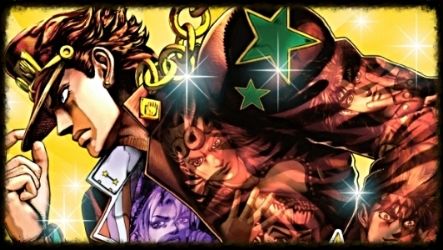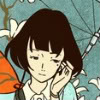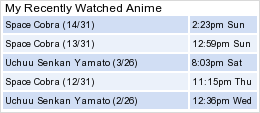Slice of Life - What Is It?
18 posts •
Page 1 of 1
Slice of Life - What Is It?
In relation to a recent post, I began wondering: how do you define slice of life as a genre? What criteria are there for delineating slice of life series from non-slice of life ones, such as dramas or comedies? I am taking what sites such as MAL classify as slice of life (which is really just a crowd-sourced classification) as basic and given. Here's the problem, though: I have been thinking about it, and any criteria that I can come up with that accommodate series that are classified as slice of life also seem to apply to series that are not classified as such; either that, or the criteria exclude series that are considered slice of life. In other words, there are counter-examples to the definitions I have come up with. Normal life? This hardly describes Aria. Day-to-day activities? This includes shows like Patlabor TV, which is a mecha comedy. Focus on relationships? Surely this is way too broad, as it denotes the vast majority of romance and shounen action shows.
So, yeah. Slice of life: what is it?
Disclaimer: I am not at all attempting to disparage this genre or any anime belonging to it. My question comes from a place of genuine interest/curiosity.
So, yeah. Slice of life: what is it?
Disclaimer: I am not at all attempting to disparage this genre or any anime belonging to it. My question comes from a place of genuine interest/curiosity.
-

TheSubtleDoctor - Posts: 1838
- Joined: Mon Dec 14, 2009 7:48 am
- Location: Region 1
Re: Slice of Life - What Is It?
Basically, it's easiest to define it by what the show is trying to do.
Slice of life is entirely about the setting. Characters and events can/do happen, but unlike other shows they merely serve to add to the setting. In stuff like Aria/YKK/Tamako Market, the goal of the show is to get you sucked up into this marvelously peaceful, nice place so you can take thirty minutes to just feel included in this wonderful setting. The characters exist not to be characters but rather to be part of the setting. In Tamako Market, it's the various shop owners that really make the show. As Tamako and co. live their day-to-day lives we get to feel like we're part of this kind place where the old guys argue about who has the better store but no one cares, where the nice crossdresser will give you a rose if you're a shy first-time visitor, where the record-shop owner will let you listen to his large collection to try and find the song your mom used to sing. Similarly, the events are not to change the status quo of the setting, but rather to add to the feel of the setting.
This is to be contrasted with, say, Toradora or Hyouka. In these shows, the characters are actually characters and the actions of the characters often have some sort of goal in mind and there can be changes in the status quo or characters. The biggest difference is the presentation of some kind of conflict, however minor/major it is. Hyouka isn't slice of life because even though it does follow Oreki and co. through their day-to-day lives, we have "real" conflicts such as the "mysteries" or character drama. Toradora isn't slice of life because it's all about Ryuuji and co. dealing with the mounting drama as they go through high school and have to deal with things like parents, crushes, and life after high school.
Slice of life is entirely about the setting. Characters and events can/do happen, but unlike other shows they merely serve to add to the setting. In stuff like Aria/YKK/Tamako Market, the goal of the show is to get you sucked up into this marvelously peaceful, nice place so you can take thirty minutes to just feel included in this wonderful setting. The characters exist not to be characters but rather to be part of the setting. In Tamako Market, it's the various shop owners that really make the show. As Tamako and co. live their day-to-day lives we get to feel like we're part of this kind place where the old guys argue about who has the better store but no one cares, where the nice crossdresser will give you a rose if you're a shy first-time visitor, where the record-shop owner will let you listen to his large collection to try and find the song your mom used to sing. Similarly, the events are not to change the status quo of the setting, but rather to add to the feel of the setting.
This is to be contrasted with, say, Toradora or Hyouka. In these shows, the characters are actually characters and the actions of the characters often have some sort of goal in mind and there can be changes in the status quo or characters. The biggest difference is the presentation of some kind of conflict, however minor/major it is. Hyouka isn't slice of life because even though it does follow Oreki and co. through their day-to-day lives, we have "real" conflicts such as the "mysteries" or character drama. Toradora isn't slice of life because it's all about Ryuuji and co. dealing with the mounting drama as they go through high school and have to deal with things like parents, crushes, and life after high school.
-

Mr. Hat'n'Clogs - Posts: 2364
- Joined: Sun Apr 19, 2009 2:16 pm
- Location: The Roaring Song-City
Re: Slice of Life - What Is It?
Two points:
(1) This is a well-thought, nuanced definition. So, if I read you correctly, slice of life is a completely viewer-focused genre? It's all about stirring up a particular feeling of nostalgia or belonging or being-present, within the viewer, rather than about narrative structure or character development. According to your definition, it also seems to overlap heavily with the "healing genre" of anime (don't know the Japanese name for it).
(2) While this definition is indeed well-constructed, it runs into the same problem i point out in my OP. It excludes works that are classified as slice of life, Haibane Renmei being a prominent one that comes to mind. HR's characters -are- real characters, whose growth is a central focus of the story. There is a pretty major conflict that takes up the last third to half of the series. Yet, everything you said about the setting being paramount and the creation of feelings within the viewer applies to HR as well.
This is the conundrum. Now, you may say that certain shows, such as Haibane Renmei, just need to be re-classified as dramas or whatever. However, I want to avoid making this move so as not to enforce my arbitrary definition upon others and to try to find a definition that accommodates the thinking of the well-meaning and thoughtful fan community.
(1) This is a well-thought, nuanced definition. So, if I read you correctly, slice of life is a completely viewer-focused genre? It's all about stirring up a particular feeling of nostalgia or belonging or being-present, within the viewer, rather than about narrative structure or character development. According to your definition, it also seems to overlap heavily with the "healing genre" of anime (don't know the Japanese name for it).
(2) While this definition is indeed well-constructed, it runs into the same problem i point out in my OP. It excludes works that are classified as slice of life, Haibane Renmei being a prominent one that comes to mind. HR's characters -are- real characters, whose growth is a central focus of the story. There is a pretty major conflict that takes up the last third to half of the series. Yet, everything you said about the setting being paramount and the creation of feelings within the viewer applies to HR as well.
This is the conundrum. Now, you may say that certain shows, such as Haibane Renmei, just need to be re-classified as dramas or whatever. However, I want to avoid making this move so as not to enforce my arbitrary definition upon others and to try to find a definition that accommodates the thinking of the well-meaning and thoughtful fan community.
-

TheSubtleDoctor - Posts: 1838
- Joined: Mon Dec 14, 2009 7:48 am
- Location: Region 1
Re: Slice of Life - What Is It?
I've always defined it as this:
In non slice-of-life shows, the plot shapes the characters and their development. While in slice-of-life shows, the characters shape each other.
healing type is 癒し形 iyashikei.
In non slice-of-life shows, the plot shapes the characters and their development. While in slice-of-life shows, the characters shape each other.
healing type is 癒し形 iyashikei.
Blessed be the LORD my strength which teacheth my hands to war, and my fingers to fight:
My goodness, and my fortress; my high tower, and my deliverer; my shield, and he in whom I trust; who subdueth my people under me.
神はそのひとり子を賜わったほどに、この世を愛して下さった。それは御子を信じる者がひとりも滅びないで、永遠の命を得るためである.
My MAL Profile. Please check out my Dad's Christian eBook on Facebook.
-

Falx - Posts: 590
- Joined: Tue Nov 10, 2009 4:05 am
- Location: South Africa
Re: Slice of Life - What Is It?
I define slice-of-life stories as those not propelled (or at least, primarily not propelled) by conflict. So to contrast Hat (and because I've realized I haven't seen anything else exclusively slice-of-life, under my definition >.>) I'd consider Hyouka slice-of-life. It's just a couple of friends hanging out and solvin' mysteries. The characters' actions aren't usually motivated by conflict, and there isn't really anything or anyone trying to foil what they do. The conflicts between people that do appear are few, far-between, small, and resolved pretty quickly. The characters undergo changes but it's not because of any trial they overcame, they were just left alone and they grew.
For the sake of having another example I'm personally familiar with, I'll temporarily consider A Bride's Story a slice-of-life as well. (It's more likely to be called historical, but I think I can let it be both here.) The heroine's there, she's been married off, and then she just sort of... hangs out with the family and gets to know them. Things do happen, but usually they aren't fueled by conflict. The bride and her husband go looking for his uncle's clan, find them, hang out and visit. One of the kids skips chores to watch a woodcarver, his mom gets annoyed and we get him to stop skipping his chores (and the attitude is more "ah, kids," than anything else). It's not really about drama between family members, or any romance between the bride and her husband, or getting laughs. It's just there, and it's enjoyable because nobody's really upset (or otherwise in conflict) with anybody.
Toradora! isn't slice of life because it's fueled by drama and conflict between characters. ("I like you but you don't like me also I have issues with my parents gaahhhh thank heavens for friendship.") Yotsuba&! and Azumanga Daioh! aren't slice-of-life because their primary goal is to be funny. (I mean, Yostuba. She does all the funny kid stuff like drawing a beard on her sleeping dad, punching goats, and freaking out about completely harmless things. It's hilarious.)
Again I really haven't seen many slice-of-life shows (or any well-known ones at all, I guess) so maybe I'm just babbling, but that's my understanding/definition of the genre.
I don't really think that's possible. If something's typically considered slice-of-life because a whole bunch of people happen to give it that categorization, there isn't necessarily any one underlying idea because every one of those individuals has their own perception of the genre. Even if there is a such an idea, there's infinitely many perceptions and infinitely many ways to word (or badly word) those perceptions, which means you could be looking for a universally-accepted definition for a really long time.
As kind of a sidenote, I've also noticed slice-of-life can get used as a catch-all for stuff that doesn't obviously fit in anywhere else, which also makes nailing down a real, universally-applicable definition difficult.
For the sake of having another example I'm personally familiar with, I'll temporarily consider A Bride's Story a slice-of-life as well. (It's more likely to be called historical, but I think I can let it be both here.) The heroine's there, she's been married off, and then she just sort of... hangs out with the family and gets to know them. Things do happen, but usually they aren't fueled by conflict. The bride and her husband go looking for his uncle's clan, find them, hang out and visit. One of the kids skips chores to watch a woodcarver, his mom gets annoyed and we get him to stop skipping his chores (and the attitude is more "ah, kids," than anything else). It's not really about drama between family members, or any romance between the bride and her husband, or getting laughs. It's just there, and it's enjoyable because nobody's really upset (or otherwise in conflict) with anybody.
Toradora! isn't slice of life because it's fueled by drama and conflict between characters. ("I like you but you don't like me also I have issues with my parents gaahhhh thank heavens for friendship.") Yotsuba&! and Azumanga Daioh! aren't slice-of-life because their primary goal is to be funny. (I mean, Yostuba. She does all the funny kid stuff like drawing a beard on her sleeping dad, punching goats, and freaking out about completely harmless things. It's hilarious.)
Again I really haven't seen many slice-of-life shows (or any well-known ones at all, I guess) so maybe I'm just babbling, but that's my understanding/definition of the genre.
TheSubtleDoctor wrote:This is the conundrum. Now, you may say that certain shows, such as Haibane Renmei, just need to be re-classified as dramas or whatever. However, I want to avoid making this move so as not to enforce my arbitrary definition upon others and to try to find a definition that accommodates the thinking of the well-meaning and thoughtful fan community.
I don't really think that's possible. If something's typically considered slice-of-life because a whole bunch of people happen to give it that categorization, there isn't necessarily any one underlying idea because every one of those individuals has their own perception of the genre. Even if there is a such an idea, there's infinitely many perceptions and infinitely many ways to word (or badly word) those perceptions, which means you could be looking for a universally-accepted definition for a really long time.
As kind of a sidenote, I've also noticed slice-of-life can get used as a catch-all for stuff that doesn't obviously fit in anywhere else, which also makes nailing down a real, universally-applicable definition difficult.
-

FllMtl Novelist - Posts: 1722
- Joined: Wed May 26, 2010 6:31 pm
- Location: Spa Maria
Re: Slice of Life - What Is It?
Falx wrote:In non slice-of-life shows, the plot shapes the characters and their development. While in slice-of-life shows, the characters shape each other.
While the plot may not shape the characters in slice of life shows (again, I'd point to Haibane Renmei as a counter-example here), I think characters-shaping-characters applies in equal measure to slice of life and non slice of life shows.
FllMtl Novelist wrote:I don't really think that's possible. If something's typically considered slice-of-life because a whole bunch of people happen to give it that categorization, there isn't necessarily any one underlying idea because every one of those individuals has their own perception of the genre. Even if there is a such an idea, there's infinitely many perceptions and infinitely many ways to word (or badly word) those perceptions, which means you could be looking for a universally-accepted definition for a really long time.
Well, because there are no accepted clear and distinct criteria, I essentially have to use consensus as my guide in determining what counts as slice of life. Since I can't, as of now, look at a checklist of characteristics and see if a show ticks all the boxes, what alternative do I have accept to trust majority opinion here? Again, I'm trying to avoid, "This show is slice of life because I say it is."
FllMtl Novelist wrote:I As kind of a sidenote, I've also noticed slice-of-life can get used as a catch-all for stuff that doesn't obviously fit in anywhere else, which also makes nailing down a real, universally-applicable definition difficult.
I am actually afraid of this being the ultimate outcome of the current exercise. If you're correct here --and-- it also happens that there are no clear and distinct criteria for what makes a series slice of life, then we really shouldn't be using the term as a genre-designator because it's completely ambiguous. It'd be like creating a genre of anime called "heart-pounding." I think that it is possible, in principle, to discover at least a broad line of demarcation b/w slice of life and non slice of life (even if there is a sort of "border zone" that contains weird, outlier cases that prove to be exceptions).
-

TheSubtleDoctor - Posts: 1838
- Joined: Mon Dec 14, 2009 7:48 am
- Location: Region 1
Re: Slice of Life - What Is It?
I wouldn't classify Haibane Renmei as a slice-of-life.
I think the main things about slice-of-life are:
1) mundane events (nobody's discovering/inventing/doing something that's going to change life as we know it from now on) and characters (usually nobody's a superhero; if the setting or the characters are not mundane, they are close enough that things don't have to be explained)
2) events fit into an expected continuity (the story isn't about an unusual excursion or exceptional event but about the ongoing progress of the lives of the characters; there's usually a sense of "life goes on" about the ending (not to be confused with an ambiguous ending)) and don't generally cover pivotal/defining moments of the characters' lives (the events covered might be any arbitrary period; if there's a coming of age, it usually happens very gradually)
3) episodic nature (there's generally not a lot of memetic baggage needed to understand any one segment of the story, allowing viewers to come in in the middle without feeling lost, though not always; things often end mostly as they began)
In short, a slice-of-life story doesn't usually contain anything particularly jarring or needing a lot of explanation.
Very few shows actually fit all of these, but a slice-of-life show should be close. I see that I've used a lot of softening modifiers. Slice-of-life can be very hard to pin down. There is a small core and a lot of edge cases, I think.
Things I would classify as slice-of-life:
Usagi Drop (While the series has a broad arc, each episode is pretty well encapsulated, and very few of them contain any major changes in direction, and the events are ones that many of us went through or can appreciate as part of the norm)
Honey & Clover (With the exception of some of the things Morita-san does, almost every event in this show probably happened to someone you knew in college, or something like it did. Memetic baggage is brought up without being explained (or needing explanation). And the overall story is more about the interactions of the whole group than about the deep desires and heartaches of any one character)
Tari-Tari (The story is driven largely by the aspirations of the characters, and a major conflict doesn't become fully apparent until late in the series)
To some extent, Cross Game (the team's aspirations to make it to Koshien are a big part of the story, but they're not the main focus, almost a backdrop to the other things that are happening in the lives of the team members)
Fruits Basket, but only partly (once the main conceit is established, it becomes largely a slice-of-life show until near the end, when things become intense and start changing direction rapidly)
I think the main things about slice-of-life are:
1) mundane events (nobody's discovering/inventing/doing something that's going to change life as we know it from now on) and characters (usually nobody's a superhero; if the setting or the characters are not mundane, they are close enough that things don't have to be explained)
2) events fit into an expected continuity (the story isn't about an unusual excursion or exceptional event but about the ongoing progress of the lives of the characters; there's usually a sense of "life goes on" about the ending (not to be confused with an ambiguous ending)) and don't generally cover pivotal/defining moments of the characters' lives (the events covered might be any arbitrary period; if there's a coming of age, it usually happens very gradually)
3) episodic nature (there's generally not a lot of memetic baggage needed to understand any one segment of the story, allowing viewers to come in in the middle without feeling lost, though not always; things often end mostly as they began)
In short, a slice-of-life story doesn't usually contain anything particularly jarring or needing a lot of explanation.
Very few shows actually fit all of these, but a slice-of-life show should be close. I see that I've used a lot of softening modifiers. Slice-of-life can be very hard to pin down. There is a small core and a lot of edge cases, I think.
Things I would classify as slice-of-life:
Usagi Drop (While the series has a broad arc, each episode is pretty well encapsulated, and very few of them contain any major changes in direction, and the events are ones that many of us went through or can appreciate as part of the norm)
Honey & Clover (With the exception of some of the things Morita-san does, almost every event in this show probably happened to someone you knew in college, or something like it did. Memetic baggage is brought up without being explained (or needing explanation). And the overall story is more about the interactions of the whole group than about the deep desires and heartaches of any one character)
Tari-Tari (The story is driven largely by the aspirations of the characters, and a major conflict doesn't become fully apparent until late in the series)
To some extent, Cross Game (the team's aspirations to make it to Koshien are a big part of the story, but they're not the main focus, almost a backdrop to the other things that are happening in the lives of the team members)
Fruits Basket, but only partly (once the main conceit is established, it becomes largely a slice-of-life show until near the end, when things become intense and start changing direction rapidly)
- skreyola
- Posts: 1046
- Joined: Mon Sep 24, 2012 10:49 pm
- Location: Northwest Florida
Re: Slice of Life - What Is It?
slice of life is about everyday life. nothing out of the ordinary happens.
- spark300c
- Posts: 48
- Joined: Tue Dec 04, 2012 5:24 am
- Location: Texas
Re: Slice of Life - What Is It?
Given the last two posts, mentioning such criteria as (a) mundane, no out-of-the-ordinary happenings and (b) no or minimal need for explanations, I'm interested in whether each of you would classify the following as slice of life and why:
Natsume Yujinchou
Aria: the Animation
Time of Eve
My Anime List says all three are slice of life, while ANN only classifies the first two as such. According to criteria listed in the previous two posts, I'm not sure any of the three count as slice of life. Thoughts?
Natsume Yujinchou
Aria: the Animation
Time of Eve
My Anime List says all three are slice of life, while ANN only classifies the first two as such. According to criteria listed in the previous two posts, I'm not sure any of the three count as slice of life. Thoughts?
-

TheSubtleDoctor - Posts: 1838
- Joined: Mon Dec 14, 2009 7:48 am
- Location: Region 1
Re: Slice of Life - What Is It?
Sadly, I have not seen any of those. I'll be happy to talk about any of the ones I have listed on MAL, though.
- skreyola
- Posts: 1046
- Joined: Mon Sep 24, 2012 10:49 pm
- Location: Northwest Florida
Re: Slice of Life - What Is It?
This is a really interesting discussion.
I think that, personally, I've always taken the term slice-of-life to mean that what you're seeing is a slice of the characters' daily lives-- not necessarily your own. So, for example, Natsume, Aria, and Time Of Eve can all be slice-of-life, not because their settings or the stuff happening in them are normal life for us, but because it's normal life for those characters.
For example: Yes, Natsume sees yokai; but for him, that's just how it is. Same with a Venetian-like society on Mars, or one containing sentient robots-- that's just the setting these people (or robots, etc.) live out their lives in, and you simply watch them do that. This definition also does not exclude series with a good dose of comedy, such as Yotsuba&! (since that series is entirely about Yotsuba's daily life ), or even series with hints of romance, like Kimi to Boku. (which IIRC is also focused much more on the characters' daily lives {and often-comedic interactions} than any drama or romance they may have in the process).
), or even series with hints of romance, like Kimi to Boku. (which IIRC is also focused much more on the characters' daily lives {and often-comedic interactions} than any drama or romance they may have in the process).
So, basically, the way I've always seen it is that slice-of-life stuff has a *main* focus on the characters' day-to-day lives, much more so than any other (plot/romance/fantasy/etc.) elements that it might also involve.
I think that, personally, I've always taken the term slice-of-life to mean that what you're seeing is a slice of the characters' daily lives-- not necessarily your own. So, for example, Natsume, Aria, and Time Of Eve can all be slice-of-life, not because their settings or the stuff happening in them are normal life for us, but because it's normal life for those characters.
For example: Yes, Natsume sees yokai; but for him, that's just how it is. Same with a Venetian-like society on Mars, or one containing sentient robots-- that's just the setting these people (or robots, etc.) live out their lives in, and you simply watch them do that. This definition also does not exclude series with a good dose of comedy, such as Yotsuba&! (since that series is entirely about Yotsuba's daily life
 ), or even series with hints of romance, like Kimi to Boku. (which IIRC is also focused much more on the characters' daily lives {and often-comedic interactions} than any drama or romance they may have in the process).
), or even series with hints of romance, like Kimi to Boku. (which IIRC is also focused much more on the characters' daily lives {and often-comedic interactions} than any drama or romance they may have in the process).So, basically, the way I've always seen it is that slice-of-life stuff has a *main* focus on the characters' day-to-day lives, much more so than any other (plot/romance/fantasy/etc.) elements that it might also involve.

Saved by grace.

MAL (Anime) - MAL (Manga) - MAL (Profile)
(^ And if you also have a MAL account, please feel free to send me a friend request there! )
)

MAL (Anime) - MAL (Manga) - MAL (Profile)
(^ And if you also have a MAL account, please feel free to send me a friend request there!
 )
)-

MangaRocks! - Posts: 1264
- Joined: Wed Jan 26, 2011 10:10 am
- Location: A room full of wonderful books... :)
Re: Slice of Life - What Is It?
Actually, yes, this is pretty much it. I'd say it's close to iyashikei but the two aren't one and the same.TheSubtleDoctor wrote:Two points:
(1) This is a well-thought, nuanced definition. So, if I read you correctly, slice of life is a completely viewer-focused genre? It's all about stirring up a particular feeling of nostalgia or belonging or being-present, within the viewer, rather than about narrative structure or character development. According to your definition, it also seems to overlap heavily with the "healing genre" of anime (don't know the Japanese name for it).
I haven't seen Haibane Renmei, so I can't talk about the specifics of whether or not it counts or what kind of weird in-between state it has (though based on what you're saying I'd probably say it's a drama in the same vein as tsuritama) but I think the notion that "this has been called this genre by a lot of people so making a definition that excludes it isn't a correct one" is a bad line of thought. I think slice-of-life -is- a vague term that a lot of people throw around in different ways, but that doesn't make it useless as a term if a useful definition is created. It also doesn't mean the term is useless, for instance, the debate about whether or not Star Wars is SF or not doesn't make SF a useless term if people can argue about what the precise definition is.(2) While this definition is indeed well-constructed, it runs into the same problem i point out in my OP. It excludes works that are classified as slice of life, Haibane Renmei being a prominent one that comes to mind. HR's characters -are- real characters, whose growth is a central focus of the story. There is a pretty major conflict that takes up the last third to half of the series. Yet, everything you said about the setting being paramount and the creation of feelings within the viewer applies to HR as well.This is the conundrum.
Now, you may say that certain shows, such as Haibane Renmei, just need to be re-classified as dramas or whatever. However, I want to avoid making this move so as not to enforce my arbitrary definition upon others and to try to find a definition that accommodates the thinking of the well-meaning and thoughtful fan community.
Another term in pretty much the same situation is moe, which is used in a thousand different ways by people but it doesn't make the term necessarily useless (though to be honest I wouldn't mind if we stopped using it, mostly because I'm tired of people talking about how it's ruined anime or whatever).
The problem with this line of thinking, I think, is that by lumping very different shows like Nichibros (whose title even contains Daily Lives) and Aria into the same category is ultimately a useless gesture. Even if you do find some loose definition that can fit all the shows that are classified as slice of life, the term becomes meaningless because the shows have literally nothing in common with each other except that neither feature physically dangerous conflicts. When I tell you something is SF or a historical epic, you can have some expectations of the show. I'd wager that the misunderstanding and confusion over the term mostly stems from the fact that we don't really have similar stories to the definition I put forth in America (as far as I know anyways) so it's an attempt to nail down a genre the Japanese get but we don't because we're used to people fighting or yelling at each other or making out or doing funny things and we don't really get something that isn't trying to do any of those, but so we end up applying the term to things we think might count.TheSubtleDoctor wrote:I am actually afraid of this being the ultimate outcome of the current exercise. If you're correct here --and-- it also happens that there are no clear and distinct criteria for what makes a series slice of life, then we really shouldn't be using the term as a genre-designator because it's completely ambiguous. It'd be like creating a genre of anime called "heart-pounding." I think that it is possible, in principle, to discover at least a broad line of demarcation b/w slice of life and non slice of life (even if there is a sort of "border zone" that contains weird, outlier cases that prove to be exceptions).
And to answer the question, only Aria is slice of life. Natsume is actually why I wouldn't want to lump iyashikei anime and slice of life as one in the same, but it's concerned with Natsume getting to meet people and make friends and the stories of the youkai and people he meets, and Time of Eve is pretty much pure SF, because the stories in the show are purely to explore robot ethics. Aria, on the other hand, is primarily concerned with explore the setting and seeing how wonderful everything is and reminding us how wonderful a place the world can be, as seen through the eyes of the sappiest girl imaginable.
-

Mr. Hat'n'Clogs - Posts: 2364
- Joined: Sun Apr 19, 2009 2:16 pm
- Location: The Roaring Song-City
Re: Slice of Life - What Is It?
Is there a driving conflict that drives and connects all the episodes? No? Then it's slice of life. [/only half serious]
I really hope it wasn't my stupid post in that other thread that sparked this thread (though I shouldn't be so vain to think so XP) and while I could copy/paste my spiel from there, I'll instead type something new.
To simplify, slice of life is eating a slice of a pie calmly as opposed to eating at a pie eating contest. For most anime that are not slice of life, their main driving force is a story, character growth and relationships and just stuff building up to other stuff, but everything is done for the sake of and because of the plot's drive (saving the world from evil/destruction is a common plot drive. for example).
Slice of life is not under such stress to build towards an ultimate goal as much as just keep the audience's interest. Thus since it doesn't have a specific direction nor a pressing need to "get" anywhere, it focuses on stand alone things, such as relationships and character development (these elements are present in non-slice of lifeanime, but they come with the conflict and building stuff to fuel the plot's drive). Most slice of life anime (that I have had the pleasure of seeing) often have stand alone episodes that may follow a simple timeline (to gauge the development of relationships and aging/maturing of the characters in some shape or form). See: Nichibros, Nichijou, or Kimi to Boku.
It should also be noted that slice of life seems to present the opportunity to develop individual characters more in depth and more detached from the adventures of the other characters. Basically, it can become a series full of a nothing but side plots to act as the main plot as one way to put it.
[/two cents]
It's been really interesting to read everyone's thoughts on this, though. I wonder if the question will ever be fully answered. O:
I really hope it wasn't my stupid post in that other thread that sparked this thread (though I shouldn't be so vain to think so XP) and while I could copy/paste my spiel from there, I'll instead type something new.
To simplify, slice of life is eating a slice of a pie calmly as opposed to eating at a pie eating contest. For most anime that are not slice of life, their main driving force is a story, character growth and relationships and just stuff building up to other stuff, but everything is done for the sake of and because of the plot's drive (saving the world from evil/destruction is a common plot drive. for example).
Slice of life is not under such stress to build towards an ultimate goal as much as just keep the audience's interest. Thus since it doesn't have a specific direction nor a pressing need to "get" anywhere, it focuses on stand alone things, such as relationships and character development (these elements are present in non-slice of lifeanime, but they come with the conflict and building stuff to fuel the plot's drive). Most slice of life anime (that I have had the pleasure of seeing) often have stand alone episodes that may follow a simple timeline (to gauge the development of relationships and aging/maturing of the characters in some shape or form). See: Nichibros, Nichijou, or Kimi to Boku.
It should also be noted that slice of life seems to present the opportunity to develop individual characters more in depth and more detached from the adventures of the other characters. Basically, it can become a series full of a nothing but side plots to act as the main plot as one way to put it.
[/two cents]
It's been really interesting to read everyone's thoughts on this, though. I wonder if the question will ever be fully answered. O:

-

goldenspines - Posts: 4869
- Joined: Thu Jan 18, 2007 8:42 am
- Location: Up north somewhere.
Re: Slice of Life - What Is It?
Loving all of the discussion. MangaRocks posted an especially interesting definition of slice of life that, though I am going to have to think about some more, seems to ring true and serve as an adequate criterion to demarcate shows we call slice of life from those we don't.
But, I wanted to address one point made by Mr. Hat'n'Clogs:
The thing is, we are talking about words, at least I am. We are trying to figure out what a certain word, that happens to signify a genre of anime, means. Words are just signs, pointing to signifiers/objects/referents, that are given meaning according to their use. So, because the meaning of the term seems vague (though, as you also assert, I am actually comfortable with a certain degree of vagueness), I am attempting to ascertain the term's definition by means of reverse engineering. People use the term in these ways...is there a way to point to all these instances of use and unify them under the umbrella of one set of criteria? This seems like a legitimate enterprise to me. I'd be with you if we were talking about, say, a moral principle: constructing a definition accommodating all the notions of "right" that are out there seems wrongheaded. But, we are talking about a word, and I don't want to just unilaterally decide, "These dudes that use a word in this way are wrong" without first exploring what we are currently exploring. Maybe they are wrong, but I dunno yet.
But, I wanted to address one point made by Mr. Hat'n'Clogs:
Mr. Hat'n'Clogs wrote:I think the notion that "this has been called this genre by a lot of people so making a definition that excludes it isn't a correct one" is a bad line of thought.
The thing is, we are talking about words, at least I am. We are trying to figure out what a certain word, that happens to signify a genre of anime, means. Words are just signs, pointing to signifiers/objects/referents, that are given meaning according to their use. So, because the meaning of the term seems vague (though, as you also assert, I am actually comfortable with a certain degree of vagueness), I am attempting to ascertain the term's definition by means of reverse engineering. People use the term in these ways...is there a way to point to all these instances of use and unify them under the umbrella of one set of criteria? This seems like a legitimate enterprise to me. I'd be with you if we were talking about, say, a moral principle: constructing a definition accommodating all the notions of "right" that are out there seems wrongheaded. But, we are talking about a word, and I don't want to just unilaterally decide, "These dudes that use a word in this way are wrong" without first exploring what we are currently exploring. Maybe they are wrong, but I dunno yet.
-

TheSubtleDoctor - Posts: 1838
- Joined: Mon Dec 14, 2009 7:48 am
- Location: Region 1
Re: Slice of Life - What Is It?
I don't know know enough about the slice of life genre to have a real opinion about its definition, but I think you can also have words that are used in multiple ways. There may be a "pure" definition of slice of life that would be recognized by a core group of people who actually know what they're talking about, and then there may be the loose definition that clueless anime fans use. And those are not necessarily the same thing.
There are lots of "specialist" words that get used that way. Sometimes the different meanings can drift even further. Consider the meaning of the word "romance." Most of the time when we are talking about "Romance stories" we are talking about fiction written about sexual/romantic relationships between two people. But a literary critic might use romance to describe a novel like The Prisoner of Zenda, the classic Ruritanian Romance, because it is a "romance" in an entirely different sense, in that it focused on "wonderful events" rather than reflecting society in a realistic way.
This is why some fields of study put an emphasis on "operational definitions." Rather than expecting everyone to use a term the way you use it, it may be better to say when you use what it means, as in "this anime is slice-of-life, and by that I mean blah blah blah." Although I suppose no one but an academic or a true geek would talk that way in real life.
There are lots of "specialist" words that get used that way. Sometimes the different meanings can drift even further. Consider the meaning of the word "romance." Most of the time when we are talking about "Romance stories" we are talking about fiction written about sexual/romantic relationships between two people. But a literary critic might use romance to describe a novel like The Prisoner of Zenda, the classic Ruritanian Romance, because it is a "romance" in an entirely different sense, in that it focused on "wonderful events" rather than reflecting society in a realistic way.
This is why some fields of study put an emphasis on "operational definitions." Rather than expecting everyone to use a term the way you use it, it may be better to say when you use what it means, as in "this anime is slice-of-life, and by that I mean blah blah blah." Although I suppose no one but an academic or a true geek would talk that way in real life.
- Mouse2010
- Posts: 348
- Joined: Fri Jan 14, 2011 5:44 pm
- Location: western US
Re: Slice of Life - What Is It?
I'm surprised no one brought up Azumanga Daioh, which qualifies in my book. I think slice-of-life, as goldy said, is anime that does not appear to have a significant driving force.
-

rocklobster - Posts: 8903
- Joined: Mon Dec 20, 2004 1:27 pm
- Location: Planet Claire
Re: Slice of Life - What Is It?
I'm leery of that definition, because it sounds too close to "has no plot", and a lot of slice-of-life has a plot. Usually, they have an ensemble of plots, with each character driving toward something in what could be a short story but none of them driving the whole show/story.
- skreyola
- Posts: 1046
- Joined: Mon Sep 24, 2012 10:49 pm
- Location: Northwest Florida
Re: Slice of Life - What Is It?
MangaRocks! wrote:I think that, personally, I've always taken the term slice-of-life to mean that what you're seeing is a slice of the characters' daily lives-- not necessarily your own. So, for example, Natsume, Aria, and Time Of Eve can all be slice-of-life, not because their settings or the stuff happening in them are normal life for us, but because it's normal life for those characters.
This is always what I've assumed SoL shows to be.
The thing about shows without a driving force is that there are many, many shows of other genres that fall under that category. Black Lagoon is about as plotless as AzuDi, but I doubt that anyone would consider it a Slice of Life show. Same for Gallery Fake, Mushishi, Master Keaton, or any number of others I could name.
At the same time, assuming that all SoL shows are plotless is not true. AzuDi has a number of overarching storylines (the cats, graduation) that - if you decide that only no-plot shows are SoL - would immediately disqualify it.
-

Atria35 - Posts: 6295
- Joined: Sat Mar 20, 2010 7:30 am
18 posts •
Page 1 of 1
Return to Anime and Anime Reviews
Who is online
Users browsing this forum: No registered users and 133 guests


